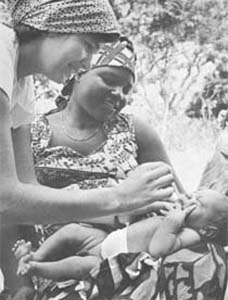February 23, 2005: Headlines: COS - Chile: Latin American Studies: Scholarly Resources: For la Patria: Politics and the Armed Forces in Latin America by Chile RPCV Brian Loveman
Peace Corps Online:
Directory:
Chile:
Peace Corps Chile :
The Peace Corps In Chile:
February 23, 2005: Headlines: COS - Chile: Latin American Studies: Scholarly Resources: For la Patria: Politics and the Armed Forces in Latin America by Chile RPCV Brian Loveman
For la Patria: Politics and the Armed Forces in Latin America by Chile RPCV Brian Loveman
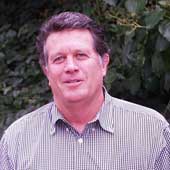
For la Patria: Politics and the Armed Forces in Latin America by Chile RPCV Brian Loveman
For la Patria
Politics and the Armed Forces in Latin America
by Brian Loveman
Cloth : 0-8420-2772-6 Price : $65.00
Quantity:
"A significant addition to the literature on the armed forces in Latin America. Certainly it will have few equals as a pedagogical tool and will serve as an invaluable reference source for anyone interested in the continent's military."
—The Historian
“Few scholars have devoted themselves more to understanding the issue of civil-military relations in Latin America than Brian Loveman…. No other work today matches its cohesiveness and breadth, which enhance its appeal to the general reader and the student alike.”
—Political Science Quarterly
Defending “la patria,” or “homeland,” is the historical mission claimed by Latin American armed forces. For la Patria is a comprehensive narrative history of the military’s political role in Latin America in national defense and security.
Latin American civil-military relations and the role of the armed forces in politics, like those of all modern nation-states, are framed by constitutional and legal norms specifying the formal relationships between the armed forces and the rest of society. In actuality, they are also the result of expectations, attitudes, values, and practices evolved over centuries—integral aspects of national political cultures. Military institutions in each Latin American nation have resulted from that country’s own blend of local and imported influences, developing a distinctive pattern of civil-military relations as defender of the fatherland and guarantor of security and order.
Written by Latin American specialist Brian Loveman, For la Patria includes tables, maps, photographs, and a glossary that will assist the student in better understanding the military’s intervention in politics in Latin America. This new text will give students a thorough and accessible history of Latin American armed forces and their actions in Latin American politics from colonial times to the present.
CONTENTS:
Introduction: Armed Forces, Militarylore, and la Patria
1. The Iberian Military Tradition: From the Kingdoms of Las Espanas to la Patria
2. Inventing la Patria: Wars, Caudillismo, and Politics, 1810-1885
3. Foreign Military Missions and la Patria
4. Variations on Patriotic Themes: la Patria and the Armed Forces from Depression to Cold War
5. La Patria and the Cold War: Pearl Harbor to the Bay of Pigs
6. La Patria and the Cold War: Bay of Pigs to the Gulf of Fonseca
7. La Patria, Regional Security, and “Democracy”
8. La Patria, the Armed Forces, and Human Rights
9. La Patria and Perestroika: Toward the Twenty-first Century
Glossary
Bibliography
Index
When this story was posted in February 2005, this was on the front page of PCOL:
 | The Peace Corps Library
Peace Corps Online is proud to announce that the Peace Corps Library is now available online. With over 30,000 index entries in over 500 categories, this is the largest collection of Peace Corps related reference material in the world. From Acting to Zucchini, you can use the Main Index to find hundreds of stories about RPCVs who have your same interests, who served in your Country of Service, or who serve in your state. |
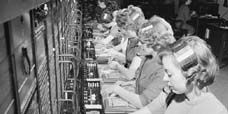 | Make a call for the Peace Corps
PCOL is a strong supporter of the NPCA's National Day of Action and encourages every RPCV to spend ten minutes on Tuesday, March 1 making a call to your Representatives and ask them to support President Bush's budget proposal of $345 Million to expand the Peace Corps. Take our Poll: Click here to take our poll. We'll send out a reminder and have more details early next week. |
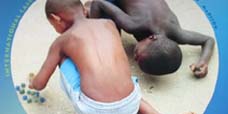 | Peace Corps Calendar:Tempest in a Teapot?
Bulgarian writer Ognyan Georgiev has written a story which has made the front page of the newspaper "Telegraf" criticizing the photo selection for his country in the 2005 "Peace Corps Calendar" published by RPCVs of Madison, Wisconsin. RPCV Betsy Sergeant Snow, who submitted the photograph for the calendar, has published her reply. Read the stories and leave your comments. |
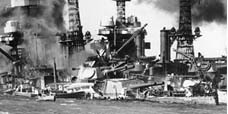 | WWII participants became RPCVs
Read about two RPCVs who participated in World War II in very different ways long before there was a Peace Corps. Retired Rear Adm. Francis J. Thomas (RPCV Fiji), a decorated hero of the Japanese attack on Pearl Harbor, died Friday, Jan. 21, 2005 at 100. Mary Smeltzer (RPCV Botswana), 89, followed her Japanese students into WWII internment camps. We honor both RPCVs for their service. |
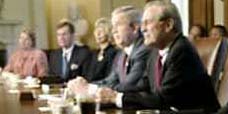 | Bush's FY06 Budget for the Peace Corps
The White House is proposing $345 Million for the Peace Corps for FY06 - a $27.7 Million (8.7%) increase that would allow at least two new posts and maintain the existing number of volunteers at approximately 7,700. Bush's 2002 proposal to double the Peace Corps to 14,000 volunteers appears to have been forgotten. The proposed budget still needs to be approved by Congress. |
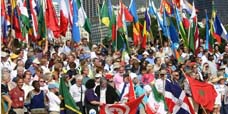 | RPCVs mobilize support for Countries of Service
RPCV Groups mobilize to support their Countries of Service. Over 200 RPCVS have already applied to the Crisis Corps to provide Tsunami Recovery aid, RPCVs have written a letter urging President Bush and Congress to aid Democracy in Ukraine, and RPCVs are writing NBC about a recent episode of the "West Wing" and asking them to get their facts right about Turkey. |
 | Ask Not
As our country prepares for the inauguration of a President, we remember one of the greatest speeches of the 20th century and how his words inspired us. "And so, my fellow Americans: ask not what your country can do for you--ask what you can do for your country. My fellow citizens of the world: ask not what America will do for you, but what together we can do for the freedom of man." |
Read the stories and leave your comments.

Some postings on Peace Corps Online are provided to the individual members of this group without permission of the copyright owner for the non-profit purposes of criticism, comment, education, scholarship, and research under the "Fair Use" provisions of U.S. Government copyright laws and they may not be distributed further without permission of the copyright owner. Peace Corps Online does not vouch for the accuracy of the content of the postings, which is the sole responsibility of the copyright holder.
Story Source: Scholarly Resources
This story has been posted in the following forums: : Headlines; COS - Chile; Latin American Studies
PCOL17373
12
.




